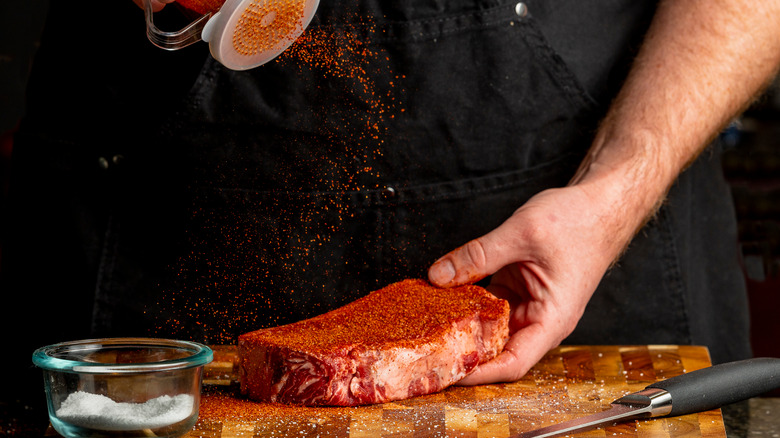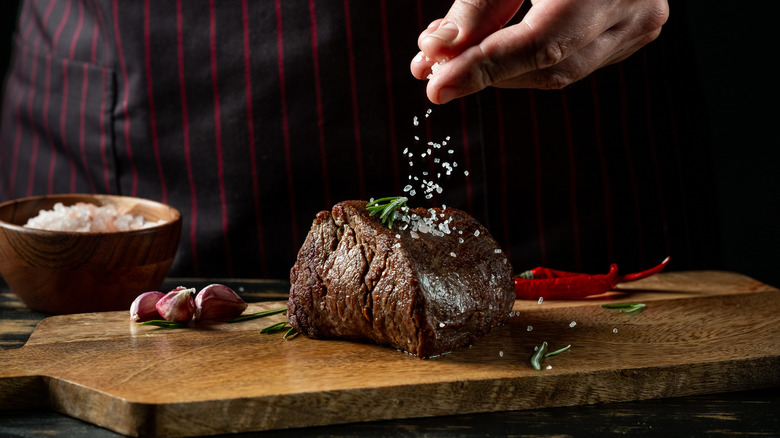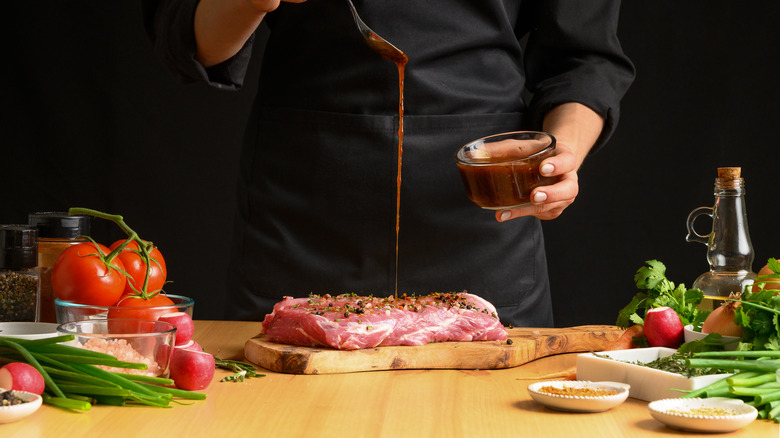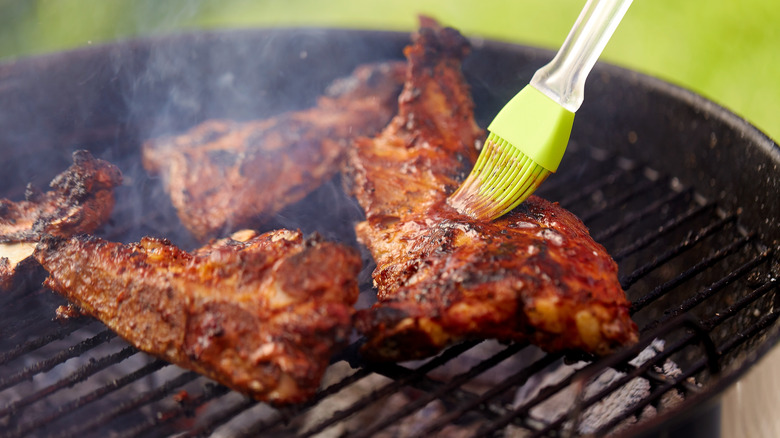Dry Rub Vs. Marinade: What's The Difference?
It's the age-old question: To rub or not to rub. Actually, not really. But there is one important question when it comes to flavoring your meats and proteins: Should you use a dry rub or a marinade?
When it comes to deciding which one will be more flavorful and the right tool for the job, it really comes down to how you will be cooking your food. There are certain times when using a dry rub is the perfect solution and there are others when a marinade should be the go-to.
The Spruce Eats explains that dry rubs are a variety of spices that are placed on the surface of the meat before it's cooked. Additionally, the spice rub should be varied and have a lot of flavor as you will want a bold taste to stick around with each bite you take. A marinade, on the other hand, is made from wet ingredients that you also put on raw protein but generally you need to let it soak for a while. The wet ingredients are then absorbed into the meat (or fish or tofu), adding more flavor and helping to make the cut more tender as it cooks, says The Spruce Eats.
What is a dry rub?
A dry rub is a combination of different spices that have been blended together for an intense flavor profile. Commonly used ingredients include paprika, cumin, onion or garlic powder, even oregano — with equal parts of heat and aromatics for a proper mix. Salt and sugar (namely brown sugar or molasses) should also always be added, says The Spruce Eats, to provide some balance. Rubs can also use wet ingredients, like Worcestershire sauce. Either way you prepare your rub, there is one big rule about when to use it.
The biggest distinction for knowing when to use a dry rub, the article adds, is that it needs to be utilized only when you are barbecuing in a low and slow style — this is not be the way to flavor a protein when grilling it, which imparts a high temp and quick cooking method.
"This is mainly because rubs will burn in the scorching heat of a grill, leaving you with a blackened, smoky mess," says The Spruce Eats. Because sugars are a main part of a rub, those start to burn at 265 degrees Fahrenheit but a grill can reach upwards of 450 degrees. If you want a dry seasoning for meats when using the grill, the site recommends some simple kosher salt and black pepper.
When using a dry rub, you'll want to ensure that your entire protein is covered. Any of the rub that is extra will end up falling off anyway, but this will provide an even coating and flavor in every bite. According to Char-Broil, you can leave your rub on for about a half-hour to ensure the coating sticks, but even so it still will not penetrate the skin like a marinade will. However, the best part about a rub is that there really is no recipe — it's all up to your personal preference.
What is a marinade?
A marinade is a combination of ingredients — always wet — that you let a protein soak in for a certain amount of time so that it can be absorbed past the surface level and impart a juicy, flavorful taste to your dish. Marinating begins the breakdown of the meat before it cooks and allows it to stay moist while it is being subject to a heat source, says The Spruce Eats. They add that marinades are particularly helpful when cooking chicken or pork loin, as those meats tend to dry out without some extra moisture. And in general, marinades are the much better option when you are grilling for this same reason — otherwise the high heat of the grill will dry out your meat and make it less enjoyable.
Marinades are usually made with vinegar, wine, or a variety of citrus juices. Even a simple Italian vinaigrette can do the trick. The acidity in these ingredients is what helps the meat break down.
It's important to note that the time needed to marinate a protein varies by type — for some foods, a marinade that's on too long will be a detriment to the flavor and texture. Fish and seafood need only 15-30 minutes, chicken requires about two hours, and beef and pork can withstand up to 12 hours or so, says The Spruce Eats. If you're marinating veggies for the grill, give root vegetables about two hours while softer items like eggplant only need 30 minutes.
When marinating, you'll also want to do so in a refrigerator rather than leave it out on the counter at room temperature. Use a food-safe container and always wash it when you are done to avoid any possible contamination from the raw meat.
Can a rub ever be a marinade?
The short answer is no — a rub can't really ever be a marinade because a rub can't penetrate the skin of meat like a marinade can. But, it can get confusing because of the option of a wet rub. A wet rub should not be confused for a marinade though, even though it uses liquid ingredients.
A wet rub, says Better Homes & Gardens, is usually made up of some of the herbs and spices that your favorite dry rub has, but with some liquid added so it becomes more of a paste. Options include mustard, oil, horseradish, and yogurt, the publication says. Or, in the case of a wet BBQ rub, which is usually applied after cooking, some maple syrup and honey. The Spruce Eats says that Worcestershire sauce can also be added for a wet rub.
The liquid in the rub is great for ease of application as it will stick to the protein better than a dry rub, but it normally evaporates when the protein is cooked. As mentioned, the wet rub won't penetrate the protein like a marinade will, so you'll also need to ensure it's is just as bold as if you were using a dry rub to get the same flavors.



